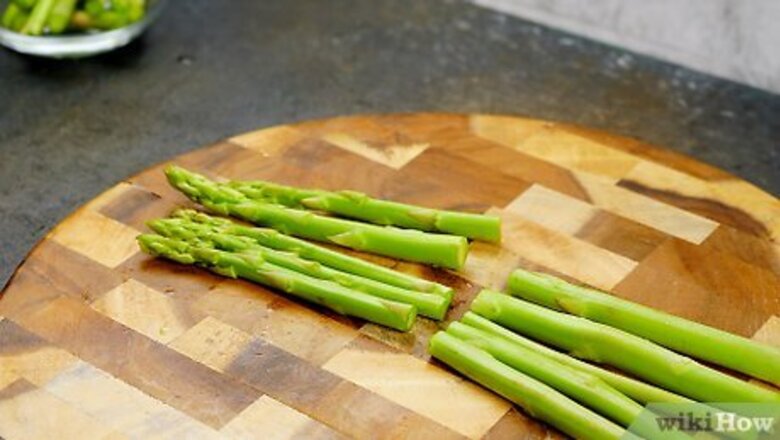
views
Steaming Asparagus on the Stove
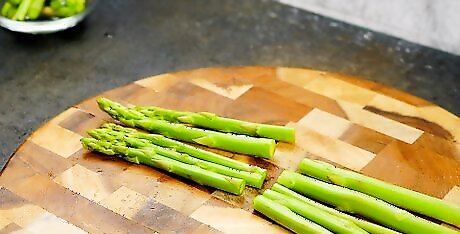
Wash and cut the asparagus. Focus on the ends when you wash it, as this is where dirt and grit are most likely to collect. Once the asparagus is clean, use a vegetable peeler to remove the scales. Lastly, hold the asparagus by each end and bend it. It will snap right where the woody part ends and the tender part begins. Discard the hard, woody part. For more details on preparing asparagus, see the section on preparing, above. Consider cutting the asparagus into smaller, bite-sized pieces.
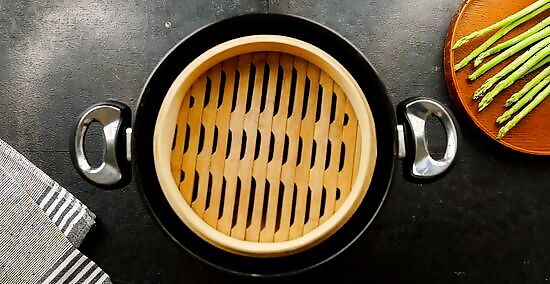
Set up your steamer. Fill a large pot with 1 inch (2.54 centimeters) of water, and place a steamer basket on top. The bottom of the steamer basket should not be touching the water.
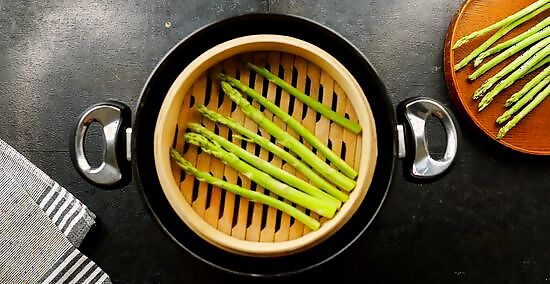
Put the asparagus into the pot and cover it with a lid. If you have not already, move the pot to the stove.
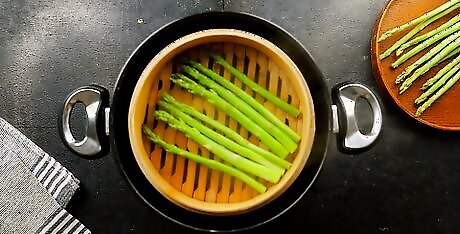
Cook the asparagus over medium-high heat until it turns bright green. For thin asparagus, this will take 3 to 5 minutes. For thick asparagus, it will take 6 to 8 minutes.
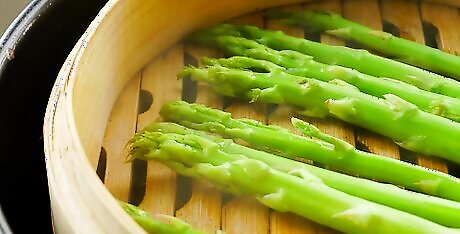
Take the lid off and check the asparagus for doneness. The asparagus should look bright green. Stick a fork or knife into one of the stems. If the asparagus is slightly tender, then it's done. If it is hard, then replace the lid and let it steam for another minute. Do not overcook the asparagus, or it will become limp and mushy and lose its bright color.
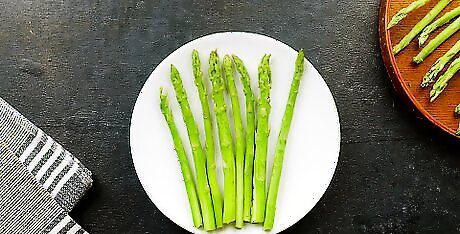
Remove the asparagus from heat. Place it in a serving dish and serve hot.
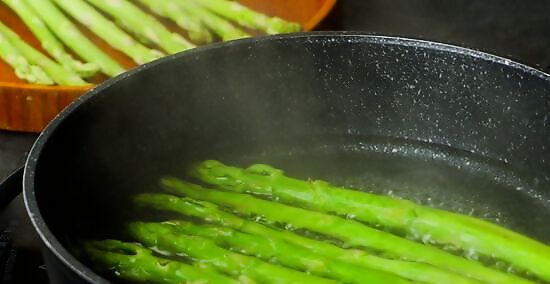
Consider steaming Asparagus in a skillet instead. Fill a skillet with ½ cup (120 milliliters) of water per ½ pound (225 grams) of asparagus. Add the asparagus, and cover the skillet with a lid. Boil over medium-high heat for about 5 minutes, or until the asparagus turns bright green and tender. Drain the water and serve the asparagus immediately.
Steaming Asparagus in the Microwave
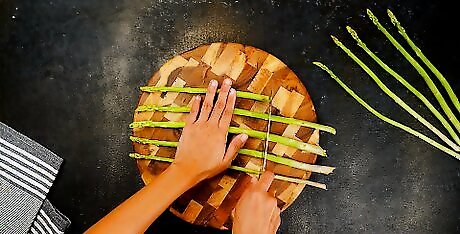
Wash and cut the asparagus. Focus on the ends when you wash the asparagus. This is where dirt and grit tend to collect. You will also want to remove the scales using a vegetable peeler. When the asparagus is clean and de-scaled, hold it by each end and bend it. It will snap right where the wood and tender parts meet. Toss the hard, woody part and keep the tender part. For more details on preparing asparagus, see the section on preparing, above. Consider cutting the asparagus into smaller, bite-sized pieces.
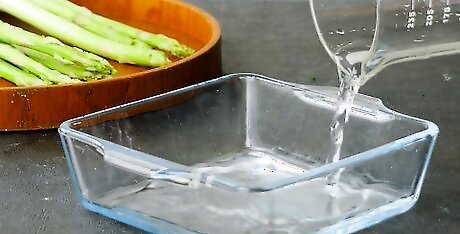
Fill a large casserole dish with 1 to 2 tablespoons of water. Make sure that the dish is large enough to fit the asparagus.
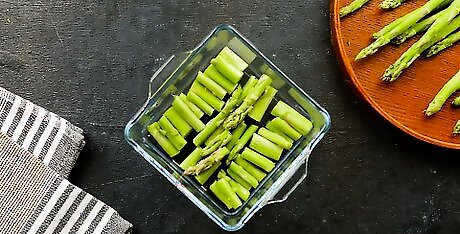
Pack 2 to 3 layers of asparagus in the dish. Start laying the asparagus stalks down side by side until the entire bottom is covered. Lay down more asparagus on top of the first layer. Keep doing this until you have 2 or 3 layers of asparagus.
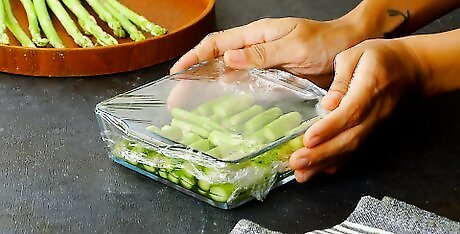
Cover the casserole dish with a sheet of plastic wrap. Run your finger around the rim of the dish to seal it. Be sure to tuck the wrap under the dish.
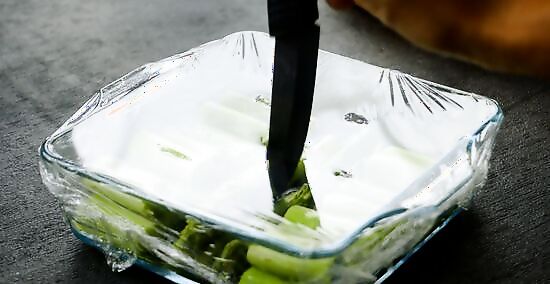
Poke a few vent holes into the plastic wrap using a fork or knife. This is very important. If you don't do this, the steam will get trapped inside the plastic and cause it to pop. The plastic wrap may also melt over the asparagus.
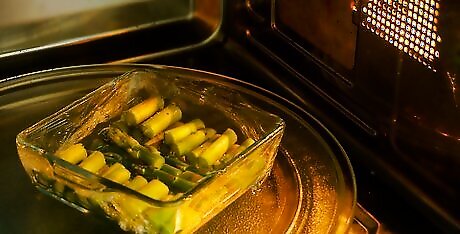
Put the dish into the microwave and heat it on high for 2 to 4 minutes. Check on the asparagus after about 2 and a half minutes to check for doneness. The asparagus is done when it turns bright green.
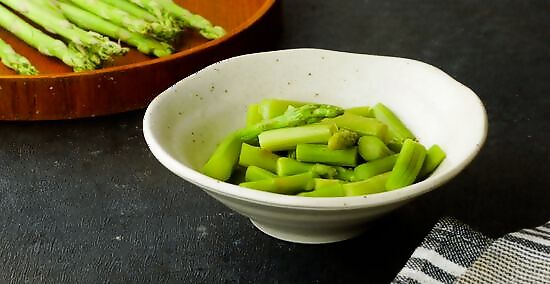
Remove the dish from the microwave and lift the plastic wrap off. Be careful while doing this so that the steam doesn't burn you. Consider using a fork or a pair of tongs to lift the plastic wrap off. Serve the asparagus immediately.
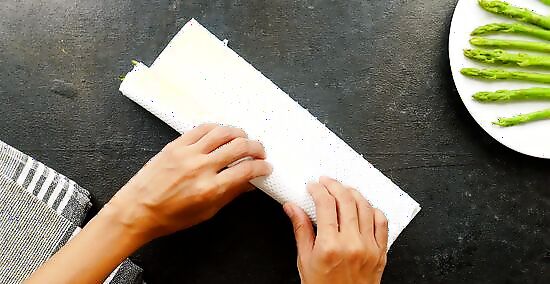
Consider wrapping stalks of asparagus in 4 sheets of damp paper towels if you are only making one or two servings. Dampen several sheets of paper towel and wrap them around the asparagus. Place the bundle, seam-side-down on a microwave-safe dish. Put the dish into the microwave, and heat for 3 to 4 minutes. Be careful when removing the asparagus from the paper towel; it will be very hot.
Seasoning Steamed Asparagus
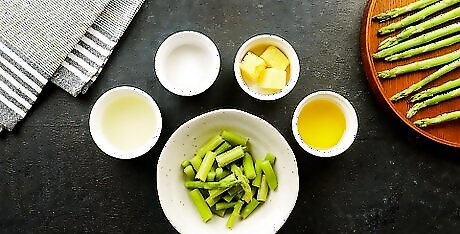
Consider seasoning the asparagus. Asparagus can be tasty on its own, but you can add some extra flavor to it with some butter, oil, lemon juice, or salt. This section will give you ideas on how you can season the asparagus once you have steamed it and are ready to serve it.
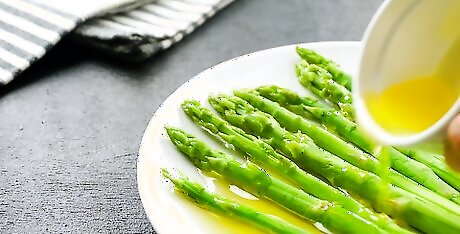
Toss steamed asparagus with some olive oil or butter. The olive oil will complement the flavor will the butter will make it richer.
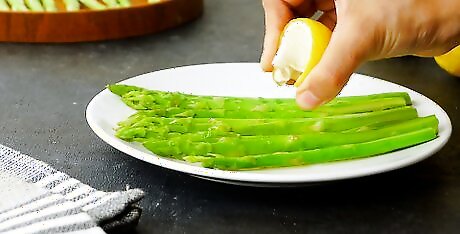
Add lemon juice or another acid. A squirt of lemon juice brings out the bright spring flavor of asparagus. Another acid flavor, like apple cider vinegar, can also work well.
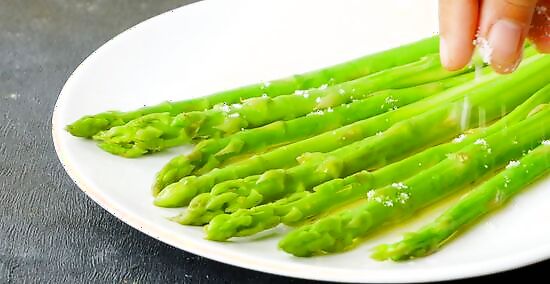
Season the asparagus. Sprinkle it with salt and pepper, and add additional seasonings like garlic powder or dried thyme to complete the dish.
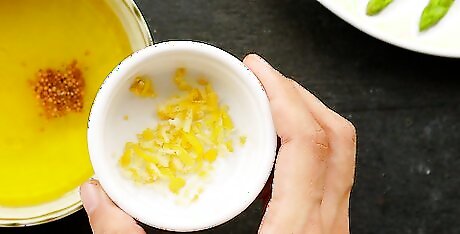
Flavor the asparagus with olive oil, lemon zest, and some salt and pepper. Stir together 2 tablespoons of extra virgin olive oil and ½ teaspoon of lemon zest. Drizzle it over the steamed asparagus. Season lightly with some salt and pepper.
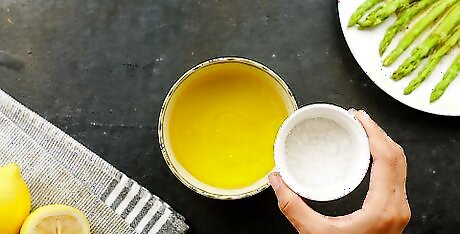
Make a lemon dressing for the asparagus. Put all of the ingredients listed below into a jar. Close the jar and shake it to mix everything together. Pour the dressing over the steamed asparagus. Here is a list of what you will need: 1/3 cup (80 milliliters) olive oil ¼ cup (60 milliliters) fresh lemon juice 1 teaspoon sugar ½ teaspoon dry mustard powder ¼ teaspoon lemon zest
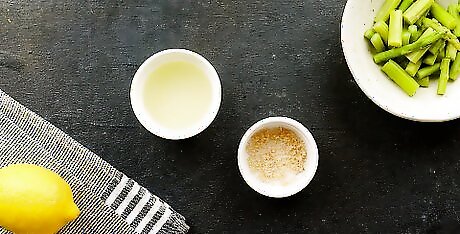
Season the asparagus with lime juice and garlic salt. You will need 1 teaspoon of garlic salt and the juice of half a lime. This is enough for ½ pound (225 grams) of asparagus.
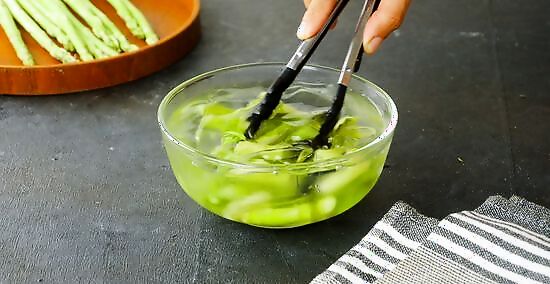
Serve the asparagus cold. Dunk steamed asparagus in a bowl filled with cold water and ice cubes. This will chill the asparagus while keeping its bright color and crispy texture. You can also simply place steamed asparagus in a colander and pour cold water over it.
Preparing the Asparagus
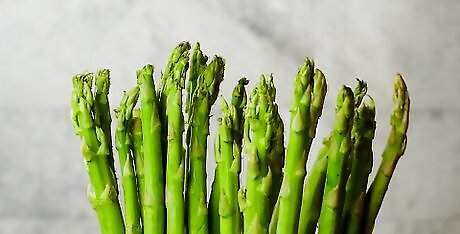
Buy fresh asparagus. Look for stalks that are firm and bright green, and avoid stalks that are limp or woody. Asparagus is at its best in early spring. Avoid asparagus with discolored parts or bruises. Frozen asparagus can also be steamed, but the texture won't be quite like steamed fresh asparagus.
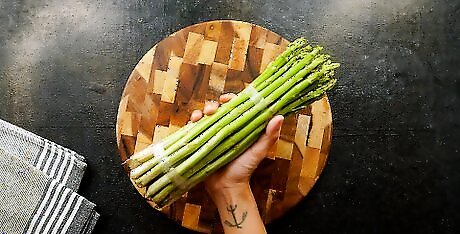
Buy only as much as you will eat. Asparagus usually comes in bundles of 14 to 18 spears. If you are cooking for multiple people, plan on having 3 to 5 spears per serving. Fresh asparagus will keep in the fridge for 3 to 4 days. If a recipe calls for 1 pound (450 grams) of asparagus, you will need 12 to 15 large spears, or 16 to 20 small spears.
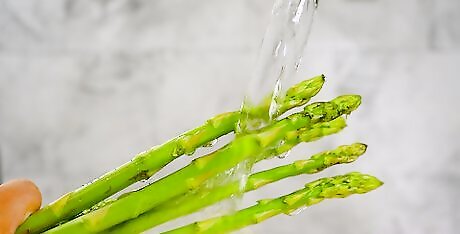
Wash the asparagus. Run the asparagus under cool water and use your fingers to remove any dirt or debris. Focus on the tips, where dirt is most likely to be caught.
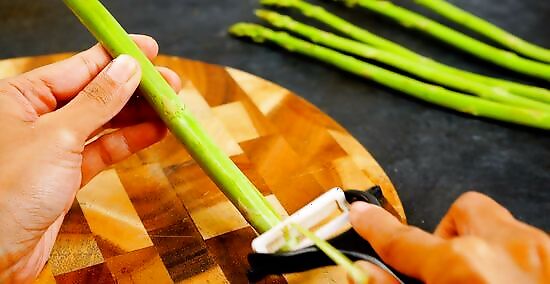
Use a vegetable peeler to remove the peel the asparagus and remove the scales. Start peeling the asparagus about 2 inches (5.08 centimeters) from the bottom. This is not necessary on thin stalks, but thick, woody stalks might need to be peeled. Not doing this may result in tough, fibrous asparagus.
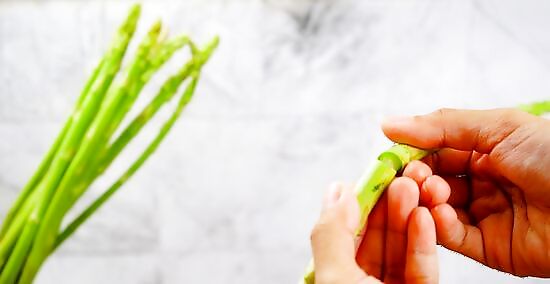
Bend the asparagus to snap off the woody parts. Hold the asparagus at each end and bend it. It will snap right where the woody part begins. This is usually around the bottom third. Discard the hard, woody, bottom part.
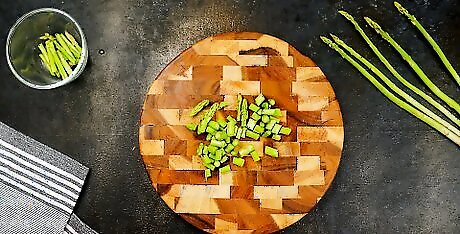
Consider cutting the asparagus into bite-sized pieces. This may help reduce the cooking time. It will also make it easier to eat.


















Comments
0 comment